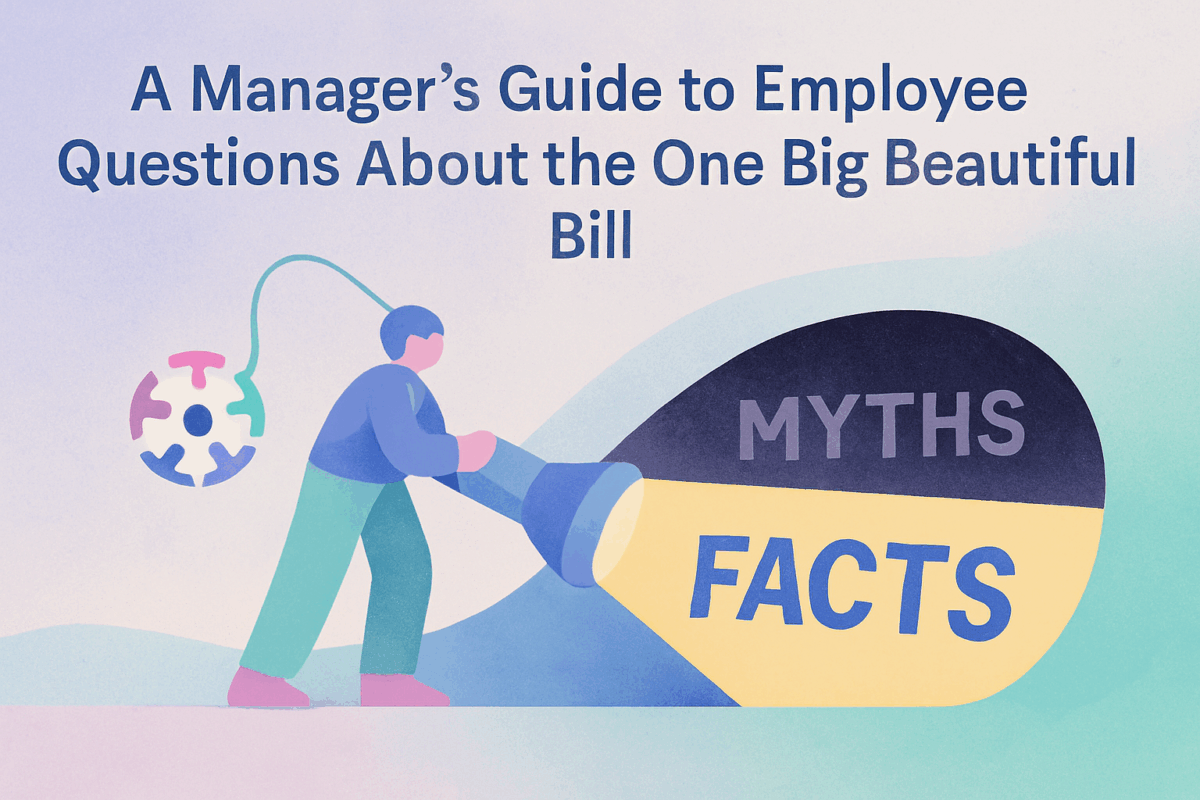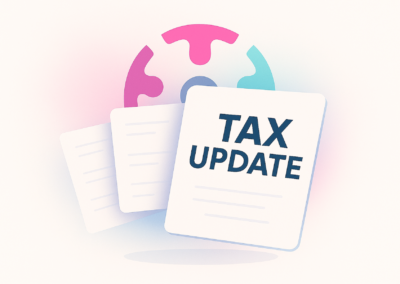Ever since July 4th, when President Trump signed the One Big Beautiful Bill Act (OBBBA) into law, employers across the country have been fielding a wave of questions from their teams.
From “When will my paycheck go up?” to “Do I still pay taxes on tips?” — the uncertainty is real.
Employees are hearing about “No Tax on Tips” and “No Tax on Overtime” from headlines, TikTok videos, and conversations with friends — and they’re trying to make sense of it all.
At dynamo HCM, we’ve been helping business owners interpret the OBBBA’s payroll-related changes and address the swirl of misinformation since the day it passed. This guide equips you to:
-
- Explain the OBBBA changes clearly to your team.
- Set realistic expectations for paycheck impact and tax savings.
- Avoid misinformation spreading via social media and word-of-mouth.
Are Paychecks Changing Automatically?
The short answer: No — not in 2025.
Here’s why:
-
- The tax benefits are deductions employees claim on their individual tax returns, not automatic changes in payroll.
- The No Tax on Overtime deduction: up to $12,500 (single filers) for the premium portion of overtime pay.
- The No Tax on Tips deduction: up to $25,000 per taxpayer.
- Deductions reduce taxable income — not dollar-for-dollar tax owed.
- Payroll taxes (Social Security & Medicare) still apply.
- Per the latest IRS update, there will be no changes to 2025 federal withholding tables — meaning employees will see benefits only when they file 2025 tax returns in 2026.
Think of it like this: If an employee usually gets a $2,000 refund, they might now get $2,500–$3,000, depending on their tax bracket. But their paycheck stubs will look the same unless they adjust their W-4.
📌 Myth vs. Fact
(Share this quick-reference with employees to clear up misinformation)
| Myth | Fact |
| Tip deduction doubles to $50,000 for married filing jointly | Under the OBBBA, the maximum “No Tax on Tips” deduction is $25,000 per return — no doubling for joint filers. |
| Overtime deduction applies to all overtime pay | Only the premium portion (the “half” in “time-and-a-half”) qualifies, based on FLSA rules. For example, under the FLSA, overtime is due only after 40 hours in a workweek, but in California, daily overtime kicks in after 8 hours in a workday — meaning some state-defined overtime won’t count toward the federal deduction. |
| Paychecks will be bigger right away | Not in 2025. IRS withholding tables aren’t changing until at least 2026 (per the IRS 2025 update). Benefits apply when filing your tax return. |
| No taxes at all on tips or overtime | Payroll taxes (Social Security & Medicare) still apply. The benefit is a federal income tax deduction. |
💡 What “Premium Portion” of Overtime Means
Under federal law (FLSA), overtime pay is generally time-and-a-half of the regular rate of pay. The premium portion is the extra pay above the regular hourly rate.
Example:
-
- Regular hourly rate: $20/hour
- Time-and-a-half rate: $30/hour
- Premium portion: $10/hour (the “half” part)
Only the premium portion is eligible for the OBBBA overtime deduction — not the full $30/hour.
Common Employee Questions — and How to Answer Them
“When will I see more money on my paycheck?”
“Your paycheck won’t change automatically in 2025. The tax savings will show up when you file your return. If you want to see a little extra in each check, you can submit a new W-4 and factor in the expected deduction — but you’ll need to estimate carefully.”
“Do I need to do anything special to get these tax breaks?”
“No changes during the year — we’ll report your tip and overtime earnings on your W-2. Your tax preparer will claim the deduction when you file.”
“I heard I don’t have to pay taxes on tips anymore. Is that true?”
“Not exactly. Social Security and Medicare taxes still apply. You get a deduction against federal income tax at year-end, up to $25,000.”
“My friend says they’re getting an extra $12,000 back — will I?”
“These are deductions, not refunds. If you earn $12,500 in qualifying overtime, your actual tax savings might be $1,250–$3,750, depending on your tax bracket.”
The W-4 Strategy for Seeing Benefits Sooner
For employees who want to see benefits during the year:
-
- Estimate annual qualifying overtime or tip income.
- Complete a new W-4 and use the “Other Deductions” section.
- Enter the deduction amount (up to $12,500 overtime / $25,000 tips).
- Submit to payroll.
📍 Important:
-
- Overestimating could mean owing money at tax time.
- The IRS will not adjust withholding tables until at least 2026.
Setting Realistic Expectations
-
- Overtime deduction: Max $12,500 → saves roughly $1,250–$3,750.
- Tip deduction: Max $25,000 → saves roughly $2,500–$7,500.
- Both are still subject to payroll taxes.
- State overtime laws (like California’s daily overtime rule) may cause confusion about which hours qualify under federal rules.
Communication Templates for Managers
All-Staff Email
Subject: Update: New Federal Tax Deductions for Tips & Overtime
Hi Team,
Recent changes under the One Big Beautiful Bill Act give tax deductions for certain overtime pay and tip income starting with your 2025 tax return.
Key points:
-
- Paychecks will not change automatically in 2025.
- We will track and report your earnings on your W-2.
- You may see tax savings when filing your return in 2026.
For personalized advice, consult your tax professional. For payroll reporting questions, reach out to [Your Contact].
Thanks,
[Your Name]
One-on-One Conversation Script
“I want to make sure you have the facts about the new tax deductions. Your paycheck won’t change automatically this year, but when you file your 2025 return, you may qualify for deductions on tip income (up to $25,000) and the premium portion of overtime pay (up to $12,500). These amounts reduce your taxable income and could mean a bigger refund — but payroll taxes still apply.”
Moving Forward with Confidence
The OBBBA’s “No Tax on Tips” and “No Tax on Overtime” provisions are real benefits, but expectations must be managed. By sharing accurate, plain-language explanations now, you can help employees avoid confusion and plan effectively.
If you’d like a ready-to-share employee handout — dispelling misinformation and explaining the “No Tax on Tips” and “No Tax on Overtime” in plain language — 📩 contact us and include ‘OBBBA employee handout’ in the comment section.


